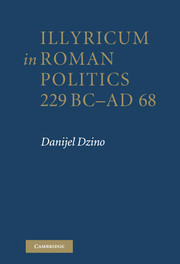Book contents
- Frontmatter
- Contents
- List of figures
- List of maps
- List of tables
- Acknowledgments
- Timeline
- 1 Introduction, approaches, review of sources and secondary literature
- 2 Illyricum in Roman foreign affairs: historical outline, theoretical approaches and geography
- 3 Roman trans-Adriatic engagement (229–168 BC)
- 4 Rome across the Adriatic in the late Republic (167–59 BC)
- 5 The construction of Illyricum: Caesar in Illyricum and the Civil Wars (59–44 BC)
- 6 Octavian in Illyricum
- 7 From senatorial to imperial Illyricum: Bellum Pannonicum
- 8 The failure of Greater Illyricum: the Bellum Batonianum
- 9 Iulio-Claudians in Illyricum: the tale of two provinces
- Conclusion: the construction of Illyricum in Roman political discourse
- Bibliography
- Index
Conclusion: the construction of Illyricum in Roman political discourse
Published online by Cambridge University Press: 05 May 2010
- Frontmatter
- Contents
- List of figures
- List of maps
- List of tables
- Acknowledgments
- Timeline
- 1 Introduction, approaches, review of sources and secondary literature
- 2 Illyricum in Roman foreign affairs: historical outline, theoretical approaches and geography
- 3 Roman trans-Adriatic engagement (229–168 BC)
- 4 Rome across the Adriatic in the late Republic (167–59 BC)
- 5 The construction of Illyricum: Caesar in Illyricum and the Civil Wars (59–44 BC)
- 6 Octavian in Illyricum
- 7 From senatorial to imperial Illyricum: Bellum Pannonicum
- 8 The failure of Greater Illyricum: the Bellum Batonianum
- 9 Iulio-Claudians in Illyricum: the tale of two provinces
- Conclusion: the construction of Illyricum in Roman political discourse
- Bibliography
- Index
Summary
‘… the Roman conception of the place to be conquered and the process of conquest are so closely related as to be the aspects of the same mentalité, and there is no need to disjoin them or seek more elaborate explanations’.
Purcell 1990a: 21Illyricum was born from a need to link Roman political interests in Macedonia and North Italy – later Cisalpine Gaul – and from the late Republican political backwater it became a crown jewel in imperial geo-political structure. The extension of Roman power in the region was a gradual process, which evolved through time from the late Republican interventionism, to the organised large-scale military operations conducted by Octavian and Tiberius. Insufficient evidence remains a great, almost unbeatable curse that Clio nostra casts upon Illyricum and its historians. It is the main reason why the indigenous peoples of Illyricum still remain ‘people without history’, to paraphrase the title of E. Wolf's influential book, and why Illyricum is still one of the least popular regions of ancient Europe for research for ancient historians.
The Roman political conduct in the region cannot be depicted or analysed in a single ‘objective’ narrative; it was a multifaceted, non-linear process, which existed in a number of different parallel historical narratives. The most influential narratives are certainly those present in the written sources, ‘the discourse of the dominant’, written by the members of the Roman elite and reflecting their perception of the world.
- Type
- Chapter
- Information
- Illyricum in Roman Politics, 229 BC–AD 68 , pp. 177 - 184Publisher: Cambridge University PressPrint publication year: 2010



